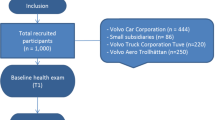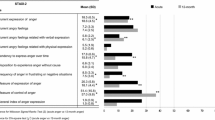Abstract
Objective
A growing number of studies have been conducted on the relationship between anger and hostility and the risk of stroke, and their conclusions are not consistent. Accordingly, we performed a meta-analysis to evaluate the relationship between anger and hostility and the risk of stroke.
Methods
We searched the PubMed and Embase databases for cohort studies, focusing on the relationship between anger and hostility and risk of stroke. Then studies were selected according to the inclusion and exclusion criteria. Study results were pooled using a random effects model.
Results
Ten studies from seven articles involving 52,277 participants were included in this meta-analysis. No significant association was found between anger and hostility level and risk of stroke (hazard ratio 1.08; 95% confidence interval 0.79–1.47). However, a positive association was seen when people with high socioeconomic status were excluded (hazard ratio 1.30; 95% confidence interval 1.06–1.59).
Conclusion
A higher level of anger and hostility is not associated with elevated risk of stroke. However, the association is positive among people with lower socioeconomic status.




Similar content being viewed by others
References
Chida Y, Steptoe A (2009) The association of anger and hostility with future coronary heart disease: a meta-analytic review of prospective evidence. J Am Coll Cardiol 53(11):936–946. https://doi.org/10.1016/j.jacc.2008.11.044
Barefoot JC, Dodge KA, Peterson BL, Dahlstrom WG, Williams RB Jr (1989) The Cook–Medley hostility scale: item content and ability to predict survival. Psychosom Med 51(1):46–57
Airagnes G, Lemogne C, Gueguen A, Hoertel N, Goldberg M, Limosin F, Zins M (2017) Hostility predicts alcohol consumption over a 21-year follow-up in the Gazel cohort. Drug Alcohol Depend 177:112–123. https://doi.org/10.1016/j.drugalcdep.2017.03.034
Progovac AM, Chang YF, Chang CH, Matthews KA, Donohue JM, Scheier MF, Habermann EB, Kuller LH, Goveas JS, Chapman BP, Duberstein PR, Messina CR, Weaver KE, Saquib N, Wallace RB, Kaplan RC, Calhoun D, Smith JC, Tindle HA (2017) Are optimism and cynical hostility associated with smoking cessation in older women? Ann Behav Med Publ Soc Behav Med 51(4):500–510. https://doi.org/10.1007/s12160-016-9873-x
Scherwitz LW, Perkins LL, Chesney MA, Hughes GH, Sidney S, Manolio TA (1992) Hostility and health behaviors in young adults: the CARDIA study. Coronary artery risk development in young adults study. Am J Epidemiol 136(2):136–145
Siegler IC, Peterson BL, Barefoot JC, Williams RB (1992) Hostility during late adolescence predicts coronary risk factors at mid-life. Am J Epid 136(2):146–154
Everson SA, Goldberg DE, Kaplan GA, Julkunen J, Salonen JT (1998) Anger expression and incident hypertension. Psychosom Med 60(6):730–735
Boyle SH, Michalek JE, Suarez EC (2006) Covariation of psychological attributes and incident coronary heart disease in U.S. Air Force veterans of the Vietnam war. Psychosom Med 68(6):844–850. https://doi.org/10.1097/01.psy.0000240779.55022.ff
Gallacher JE, Yarnell JW, Sweetnam PM, Elwood PC, Stansfeld SA (1999) Anger and incident heart disease in the caerphilly study. Psychosom Med 61(4):446–453
Koskenvuo M, Kaprio J, Rose RJ, Kesaniemi A, Sarna S, Heikkila K, Langinvainio H (1988) Hostility as a risk factor for mortality and ischemic heart disease in men. Psychosom Med 50(4):330–340
Koton S, Tanne D, Bornstein NM, Green MS (2004) Triggering risk factors for ischemic stroke: a case-crossover study. Neurology 63(11):2006–2010
Everson SA, Kaplan GA, Goldberg DE, Lakka TA, Sivenius J, Salonen JT (1999) Anger expression and incident stroke: prospective evidence from the Kuopio ischemic heart disease study. Stroke 30(3):523–528
Eng PM, Fitzmaurice G, Kubzansky LD, Rimm EB, Kawachi I (2003) Anger expression and risk of stroke and coronary heart disease among male health professionals. Psychosom Med 65(1):100–110
Chaput LA, Adams SH, Simon JA, Blumenthal RS, Vittinghoff E, Lin F, Loh E, Matthews KA (2002) Hostility predicts recurrent events among postmenopausal women with coronary heart disease. Am J Epidemiol 156(12):1092–1099
Martin R, Watson D, Wan CK (2000) A three-factor model of trait anger: dimensions of affect, behavior, and cognition. J Pers 68(5):869–897
Schulman JK, Stromberg S (2007) On the value of doing nothing: anger and cardiovascular disease in clinical practice. Cardiol Rev 15(3):123–132. https://doi.org/10.1097/01.crd.0000246318.59658.25
Stroup DF, Berlin JA, Morton SC, Olkin I, Williamson GD, Rennie D, Moher D, Becker BJ, Sipe TA, Thacker SB (2000) Meta-analysis of observational studies in epidemiology: a proposal for reporting. Meta-analysis of observational studies in epidemiology (MOOSE) group. Jama 283(15):2008–2012
Moher D, Liberati A, Tetzlaff J, Altman DG (2009) Preferred reporting items for systematic reviews and meta-analyses: the PRISMA statement. Ann Intern Med 151(4):264–269, w264
Wells G, Shea B, O’Connell D, Peterson J, Welch V, Losos M, Tugwell P (2011) The Newcastle–Ottawa Scale (NOS) for assessing the quality of nonrandomised studies in meta-analyses. http://www.ohri.ca/programs/clinical_epidemiology/oxford.asp. Accessed 10 Oct 2018
Williams JE, Nieto FJ, Sanford CP, Couper DJ, Tyroler HA (2002) The association between trait anger and incident stroke risk: the atherosclerosis risk in communities (ARIC) study. Stroke 33(1):13–19
Stürmer T, Hasselbach P, Amelang M (2006) Personality, lifestyle, and risk of cardiovascular disease and cancer: follow-up of population based cohort. BMJ 332(7554):1359–1362. https://doi.org/10.1136/bmj.38833.479560.80
Wong JM, Na B, Regan MC, Whooley MA (2013) Hostility, health behaviors, and risk of recurrent events in patients with stable coronary heart disease: findings from the heart and soul study. J Am Heart Assoc 2(5):e000052. https://doi.org/10.1161/jaha.113.000052
Everson-Rose SA, Roetker NS, Lutsey PL, Kershaw KN, Longstreth WT Jr, Sacco RL, Diez Roux AV, Alonso A (2014) Chronic stress, depressive symptoms, anger, hostility, and risk of stroke and transient ischemic attack in the multi-ethnic study of atherosclerosis. Stroke 45(8):2318–2323. https://doi.org/10.1161/strokeaha.114.004815
Nabi H, Kivimaki M, Sabia S, Dugravot A, Lajnef M, Marmot MG, Singh-Manoux A (2009) Hostility and trajectories of body mass index over 19 years: the Whitehall II study. Am J Epidemiol 169(3):347–354. https://doi.org/10.1093/aje/kwn333
Chida Y, Hamer M (2008) Chronic psychosocial factors and acute physiological responses to laboratory-induced stress in healthy populations: a quantitative review of 30 years of investigations. Psychol Bull 134(6):829–885. https://doi.org/10.1037/a0013342
Brydon L, Lin J, Butcher L, Hamer M, Erusalimsky JD, Blackburn EH, Steptoe A (2012) Hostility and cellular aging in men from the Whitehall II cohort. Biol Psychiatry 71(9):767–773. https://doi.org/10.1016/j.biopsych.2011.08.020
Gottdiener JS, Kop WJ, Hausner E, McCeney MK, Herrington D, Krantz DS (2003) Effects of mental stress on flow-mediated brachial arterial dilation and influence of behavioral factors and hypercholesterolemia in subjects without cardiovascular disease. Am J Cardiol 92(6):687–691
Shimbo D, Chaplin W, Kuruvilla S, Wasson LT, Abraham D, Burg MM (2009) Hostility and platelet reactivity in individuals without a history of cardiovascular disease events. Psychosom Med 71(7):741–747. https://doi.org/10.1097/PSY.0b013e3181ad18b6
Markovitz JH (1998) Hostility is associated with increased platelet activation in coronary heart disease. Psychosom Med 60(5):586–591
Brummett BH, Boyle SH, Ortel TL, Becker RC, Siegler IC, Williams RB (2010) Associations of depressive symptoms, trait hostility, and gender with C-reactive protein and interleukin-6 response after emotion recall. Psychosom Med 72(4):333–339. https://doi.org/10.1097/PSY.0b013e3181d2f104
Puterman E, Epel ES, O’Donovan A, Prather AA, Aschbacher K, Dhabhar FS (2014) Anger is associated with increased IL-6 stress reactivity in women, but only among those low in social support. Int J Behav Med 21(6):936–945. https://doi.org/10.1007/s12529-013-9368-0
Girard D, Tardif JC, Boisclair Demarble J, D’Antono B (2016) Trait hostility and acute inflammatory responses to stress in the laboratory. PLoS One 11(6):e0156329. https://doi.org/10.1371/journal.pone.0156329
Moons WG, Eisenberger NI, Taylor SE (2010) Anger and fear responses to stress have different biological profiles. Brain Behav Immunity 24(2):215–219. https://doi.org/10.1016/j.bbi.2009.08.009
Steptoe A, Cropley M, Griffith J, Kirschbaum C (2000) Job strain and anger expression predict early morning elevations in salivary cortisol. Psychosom Med 62(2):286–292
Gallo LC, Matthews KA (2003) Understanding the association between socioeconomic status and physical health: do negative emotions play a role? Psychological bulletin 129(1):10–51
Schieman S (2000) Education and the activation, course, and management of anger. J Health Soc Behav 41(1):20–39
Kitayama S, Park J, Boylan JM, Miyamoto Y, Levine CS, Markus HR, Karasawa M, Coe CL, Kawakami N, Love GD, Ryff CD (2015) Expression of anger and ill health in two cultures: an examination of inflammation and cardiovascular risk. Psychol Sci 26(2):211–220. https://doi.org/10.1177/0956797614561268
Borenstein M, Higgins JP, Hedges LV, Rothstein HR (2017) Basics of meta-analysis: I 2 is not an absolute measure of heterogeneity. Res Synth Methods 8(1):5–18. https://doi.org/10.1002/jrsm.1230
Acknowledgements
This work was supported by a National Science and Technology Major Project (2017ZX10201101) and a China Medical University Major Clinical Medicine Construction Project in 2018 (111-3110118036).
Author information
Authors and Affiliations
Corresponding authors
Ethics declarations
Conflicts of interest
The authors declare that they have no conflicts of interest.
Ethical standards
This manuscript does not contain clinical studies or patient data.
Rights and permissions
About this article
Cite this article
Chen, H., Zhang, B., Xue, W. et al. Anger, hostility and risk of stroke: a meta-analysis of cohort studies. J Neurol 266, 1016–1026 (2019). https://doi.org/10.1007/s00415-019-09231-1
Received:
Revised:
Accepted:
Published:
Issue Date:
DOI: https://doi.org/10.1007/s00415-019-09231-1




